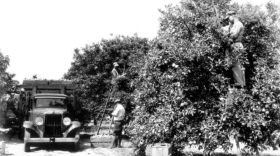-
Walls, with the Florida Department of Citrus in Bartow, explains how drinking the beverage can help you beat the summer heat.
-
The citrus industry faces the smallest harvest this season in more than a century.
-
Florida citrus officials are promoting the “grit of this industry” as the growing season is set to close with the lowest production in nearly a century. But they say growers are getting more anxious while continuing to wait for federal assistance approved after Hurricane Ian and Hurricane Nicole uprooted trees and flooded fields last fall.
-
After spiking through the 20th century, fertilizer use by Florida farmers appears to be leveling off. But will it be enough?
-
The U.S. Department of Agriculture on Friday issued a forecast that said Florida growers this season are on pace to fill 15.65 million boxes of oranges, which would be the lowest total since the 1934-1935 season.
-
It's the latest blow to Florida's citrus industry, which has struggled for two decades with deadly citrus-greening disease.
-
The Florida citrus industry could have its hardest year since the Great Depression after two back-to-back hurricanes this fall.
-
The forecast for the 2022-2023 season would put the industry at roughly half of the production from the 2021-2022 growing season, which itself resulted in decades-low numbers.
-
Growers in parts of Polk, Highlands, Hardee and DeSoto counties report that Ian claimed from 50 to 90 percent of their citrus crops. Before the storm, the state’s citrus harvest was already expected to be the lowest since 1935.
-
Before the storm, citrus production was already forecast to drop by a third compared with the year before. Estimated losses could run as much as $304.2 million.
-
An initial forecast for the growing season showed overall citrus production down a projected 31.8 percent from the past season. That came out before Hurricane Ian damaged crops.
-
Florida growers have struggled for years against residential and commercial development, foreign imports, changes in beverage consumption habits and, since 2005, citrus greening, an incurable bacterial disease.
Play Live Radio
Next Up:
0:00
0:00
Available On Air Stations











